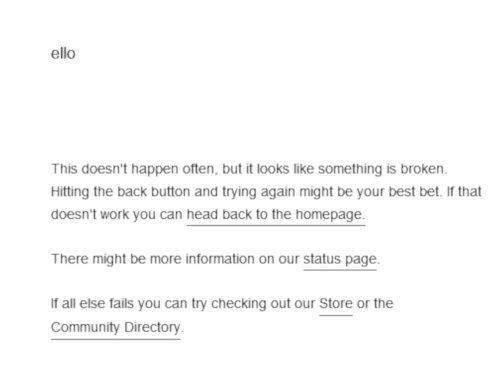
Suddently, without warning, my favourite social media site, Ello, disappeared 2023-06-22. It seemed to sputter back to life at one point, then died sometime in 2023-07, while I was in Iceland, one year ago. Here was the last, unhelpful, message:

Ello was an online social networking service = social media site, created by bicycle entrepreneur Paul Budnitz (1967 – ) and Todd Berger (? – ) of graphic designers Berger & Föhr. In 2014-01, FreshTracks Capital provided $435 000 of seed funding. Ello launched on 2014-03-19. Originally it was a private social network of and for seven artists and programmers. By 2014-04-03, the site started to allow the public to participate, initially by invitation only.
The launch included a manifesto that promised never to sell user data, proclaiming: You Are Not a Product. It never showing advertisements, and avoided a real-name policy. All of these contrasted with Facebook. For example, in 2014-09, numerous members of the LGBTQ community left Facebook following the controversial enforcement of its real-name policy. Many came to Ello. At its peak, Ello processing 30 000 signup requests/ hour, 20% remaining active one week after registration.
In 2014-10, Ello reorganized itself as a benefit corporation and raised a further $5.5 million in venture capital. The user base of Ello were primarily artists and other creative people. The great mystery of Ello, was how it survived economically, once the capital was used up. Yes, there were Ello T-shirts available through Threadless. In 2018, the original owners bailed out, when Talenthouse acquired Ello for an undisclosed amount.
After registering in 2015, I found it useful to find photographs from greater Vancouver. For example: Rosalina Gomes, provided photographs of New Westminster, including one posted at the beginning of this post; David Miller, recreated logos for iconic companies, such as White Spot, as well as highways, such as the Yellowhead; Andrew Sommerfeld = Rhinoceros, was one who published numerous nature photographs, especially along the trails of North Vancouver. Other interesting contributors included: Dark Beauty magazine, who presented Gothic fashion photographs; Adam Krowitz = Droneman, who provided interesting drone photographs of Australia, including the Baha’i House of Worship, near Sidney; Joshua LaCunha, who used tintype techniques to portray members of the San Francisco Fire Department; Michael Ostrogorsky, posted numerous photos of his parrots, and photos of Seattle; Skyler Schoos, posted photos of herself in Seattle; Susie Stiles = Geeksusie, used French captions to describe photographs of numerous paintings, some she made herself, but also many by numerous others.
Many people open and closed accounts at great speed, deleting their artwork as they left. I learned that if I wanted to access content, I had to make my own copies, or they could disappear. There was less censorship on Ello, than on many similar sites, especially in 2018, with an influx of many new users, who described themselves as Tumblr refugees. Tumblr apparently allowed explicit content until 2018, when it decided this content was immoral. It then used flawed software to determine what to delete. Unfortunately, that software was unable to distinguish raw chicken from nude humans. Similarweb an Israeli company specializing in web analytics estimated Tumblr had lost 30% of its user traffic with its stricter content policy.
I appreciated Ello for its content diversity. One appropriate comment was that: Ello seems fated to become the betamax of social media: superior to its competitor but failing to win popular traction. But it doesn’t matter … A social network doesn’t need approval from everyone to work.
I will close my comments about Ello with a photo taken by Chris N, titled Rakotzbrücke = Devil’s Bridge, in the Rhododendron Park Kromlau, in the Spree Forest region, close to the polish border, next to Gablenz in Saxony, in the former East Germany. There are many photographs of the bridge, but I felt this one gave it life.

On 2024-06-07, I read a post in /. = slashdot.org about an article in Fast Company, on artists using the anti-AI portfolio app Cara after Meta began using Instagram content to train its AI models. On 2024-05-31 there were 100 k users, which by 2024-06-02 had grown to 300 k profiles. By the time I had joined within minutes of reading about Cara, my first notification stated there were over 700 k members/ users/ hangers on.
I am opposed to the actions of Meta. While I have not deleted my Facebook or Instagram accounts I don’t use them. If I am desperate to see Facebook content, I approach another user and ask her to access it. So one can rightly conclude that I am an unprincipled hypocrite, when it comes to Meta.
Cara claims to prohibit AI models from scraping its content. Yet, its approach to protect users is primitive and probably ineffective. They automatically add NoAI metadata tags on posts. Glaze is a more effective appoach to protect artists’ work against scrapers, but users can only use it a limited number of times. Glaze was developed by the Security, Algorithms, Networking and Data laboratory (SAND lab) at the University of Chicago, that works on topics in security, machine learning, networked systems, human-computer interaction (HCI), data mining and modeling. This makes it much more difficult for AI models to accurately understand and mimic an artist’s personal style. The tool claims to understand how AI bots perceive artwork. It then makes a set of minimal but invisible changes that confuse AI models. This means that the AI bot will have difficulty generating warped recreations. Warp, here, refers to an algorithmic process that reshapes/ recreates artistic works. Cara plans to use Nightshade, another SAND lab software product that helps protect artwork against AI scrapers. Nightshade corrupts AI training data by adding invisible pixels to artwork that can cause AI software to completely misunderstand the image. Cara also attempts to detect and forbid posted AI artwork from its site, unless it’s been appropriately labeled by the poster.
If one wants to try using AI to create artwork, the latest software I have used has been provided by Craiyon.
Note: iGoogle was a dashboard launched in 2005. I used a personalized version of it as my homepage, for several years, until it disappeared towards the end of 2013. I missed it, and wrote a weblog post about it in 2018. Once I had concluded that Ello was not returning, I started to write this post about it already in 2023-08.




